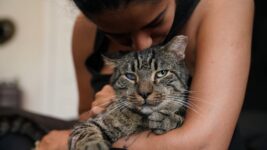
Cats catch mice, birds depending on personality, scientists say
All house cats have the ability to be lethal predators, even if they never act like it − as can be seen in viral TikTok videos showing cats lazily look on at mice that would be easy targets, except the cat seems completely uninterested.
The cats in the videos aren’t lazy or broken, they just have nicer personalities that lower their drive to kill, scientists say.
If a cat has a more pleasant personality − like if it is friendly with people and other cats − that could correlate with it catching less prey, said Emmanuelle Baudry, an ecologist and lead author of the study, “Pet cat personality linked to owner-reported predation frequency.”
“This is not cats being broken at all – this is cats being just fine and friendly, nice, wonderful pets,” Baudry told USA TODAY.
For years, scientists did not consider the different observable personalities in cats, Baundry and her co-authors wrote in their 2022 study. Only recently did biologists begin to hypothesize that a cat’s individual personality could correlate with its hunting tendencies, the authors said.
The study out of France “is super interesting because we’re in an age where we’re spending a lot more time studying cats and cat personalities, and kind of finding all the nuances to the behavior,” said Wailani Sung, a cat behaviorist who helped make the 2022 Netflix documentary Inside the Mind of a Cat.
All cats have ability to catch and kill
Unless your cat is very old or ill, it can instinctually stalk rodents and pounce at birds, Baudry said.
Scientists have long observed that kittens do not need to be taught how to hunt, and that they’re born with the ability and knowledge to catch their own food, said Sung, who now works with the animal shelter Joybound People & Pets in Walnut Creek, California.
But, “cats have different personalities, and this is totally obvious for cat owners,” Baudry said.
Growing up in Flushing, Queens, Sung said she and her brother had two pet cats with different propensities for hunting: Blackie, a female tuxedo who was lured off the street as a 6-month-old kitten, and Veenie, a male adopted as an adult from the humane society, Sung said.
Once, when there was a mouse in Sung’s childhood home, Blackie immediately bit the mouse “like a snake striking a target.” Meanwhile, Veenie nuzzled up against the mouse, Sung said, laughing.
“It just highlighted the two different personalities and how they respond to prey,” Sung said.
If a kitten grew up feral and had lots of practice hunting from a young age, they also may be more likely to hunt throughout their life, Sung said.
What different personalities do cats have?
Baudry and other researchers in France analyzed over 2,500 pet cats that had access to the outdoors. Some of the cats brought prey home and some did not.
The scientists found that a cat’s prey drive correlated with these main personality traits: Agreeableness, adventurousness, aggressiveness/dominance and shyness, which researchers called “neuroticism.”
Genetics and the cat’s home environment also contribute to the animal’s personality, said Bruce Kornreich, a professor at Cornell University College of Veterinary Medicine who focuses on cats.
“It may be that the same genetic mechanism that causes them to want to cuddle with their owner also makes them less likely to hunt,” Kornreich told USA TODAY.
If your cat is friendly or shy, it’s less likely to hunt, study says
Baudry’s study found cats with highly agreeable personalities, like snuggling and spending quality time with their owners, were far less likely to bring home rodents and birds.
Cats that were more adventurous, curious or aggressive were more likely to bring back prey. Cats that are bullies toward other cats also correlate with a higher prey drive, the study found.
“Personality differences therefore seem to contribute to the high variability in predation rates among domestic cats,” the authors wrote.
But even among cats that enjoyed going outside more, there was a split between cats that were active outside and cats that just rested outdoors, said Baudry.
Cats that roamed and explored outdoors were more likely to hunt, whereas “some cats are outside just sleeping in a nice place, like under a nice bush,” Baudry said.




